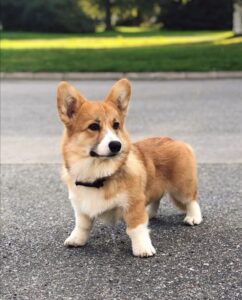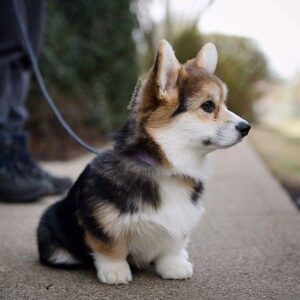The Ultimate Corgi Resource: Everything You Need to Know About Corgi .

Welcome to our comprehensive guide about Corgi , the delightful, fluffy bundles of joy that have captured hearts worldwide. Corgi puppies, known for their small size, long flowing coats, and friendly demeanor, have a rich history that spans over a thousand years.
The Corgi coat can vary in color and waviness. The Corgi is very adaptable to small living situations like apartments and small homes and they do very well with children.
The Corgi breed originated in China, likely dating back to around 800-200 BC during the Tang Dynasty. They were bred as companion dogs for royalty and nobility.
Corgi make great family pets and are suited well for children and seniors and adapt well to smaller living environments such as apartments.
This article serves as a one-stop resource for all things Corgi . We’ll explore everything from their charming appearance and adaptable nature to their friendly demeanors and trainability.
Learn More About Corgi
Corgi are a small breed, typically weighing between 9 to 16 pounds (4 to 7 kilograms) and standing about 8 to 11 inches (20 to 28 centimeters) tall at the shoulder.



Body: They have a sturdy and compact body with a slightly longer than tall proportion. Despite their small size, they are well-muscled and balanced.
Head: The most striking feature of a Corgi is its head, which is round and broad, with a short muzzle and a well-defined stop (the point where the forehead meets the muzzle).
Colors: Corgi come in a variety of colors and combinations, including solid colors (such as gold, white, black, or liver), brindle, or various combinations of these colors.
Adaptability – ★★★★☆
Corgi are known for their high adaptability, earning them a 4-star rating compared to other ‘doodle’ breeds. Their flexible nature and ability to adjust to various environments make them a popular choice for many households.
Good for apartment or small living environments
The Corgi are very adaptable in small living environments like apartments due to their small size. Although they need their daily exercise, Corgi’s are relatively low energy compared to other toy-sized breeds. If they are well socialized early on in their life, they will also be very welcoming with visitors that come over.
Easy to Travel With
Given their small size and adaptable nature, Corgi are relatively easy to travel with. They can adjust to new environments quickly, although, like any dog, they may need some time to become comfortable in unfamiliar settings. Many smaller Corgi can also be carried on the cabin with you during air travel if their carrier is small enough to fit under the seat in front of you.
Good for first-time dog owners
Because of the easy well-mannered nature of the Corgi , they can be a perfect option for first-time dog owners. Although, you will need to practice plenty of patience during house training as a puppy, as with any dog. Once you spend this time and build a bond with them, they will be your most loyal friend for life.
Highly Sensitive Temperament
The Corgi is a very loyal and affectionate breed. They are highly sensitive to unknown environments and stern reprimand. They always seek your affection and while other dogs can tolerate a loud tone or a chaotic household, the Corgi does much better in calm environments with a lot of praise and positive reinforcement.
Low Tolerance for being left alone
Although it isn’t healthy to leave any dog alone for too long, the Corgi is especially sensitive to being left alone for long hours and will develop separation anxiety that can leave to other behavioral issues like chewing on their bedding or other household items, barking, whining, and more. If you give your Corgi an ample amount of love and attention, they will repay you with perfect adoring behavior.
Does not do well in extreme weather
Although the Corgi can develop a thick coat, due to their small size, they are very sensitive to extreme hot and cold temperatures and should only be considered adopting if they primarily live in your home. Although they love to play outdoors, if it is a hot summer, be sure they are around an area with plenty of shade, have water nearby and aren’t left alone for too long. In the winter months, depending on the weather, they will likely only enjoy 15 minutes at a time outside and it is highly encouraged to equip them with a doggy sweater.
Friendliness – ★★★★★
Corgi are renowned for their friendly nature, earning them a 5-star rating in this category. They are extremely affectionate dogs that thrive on human companionship. Their sociable personality and love for playtime make them a joy to be around.
Dog Friendly
Corgi generally get along well with other dogs and pets, especially if they’ve been socialized properly from a young age. They can be a great addition to a household with existing pets, providing companionship and playful energy.
Family friendly
Corgi are excellent family pets. They are good with adults and children alike, forming strong bonds with their human family members. Their small size makes them great companions for older children, but younger children should always be supervised to ensure gentle play.
Friendly with Visitors
Corgi are usually friendly towards strangers, although they may initially be a bit reserved. Once they warm up to visitors, they are often quite welcoming and sociable. They are not typically used as guard dogs, but they will likely alert you with a bark when someone is at the door.
Trainability – ★★★★☆
Known for their intelligence and eager-to-please nature, Corgi score high when it comes to trainability, earning a solid 4 out of 5 stars.
Responds well to positive reinforcement
Positive reinforcement techniques work best with Corgi. They respond well to rewards such as treats, praises, or playtime. It’s important to be patient and consistent during training sessions. Make sure to keep training sessions short and fun to maintain their interest and prevent them from getting bored or overwhelmed.
Easy to train
Corgi, thanks to their Poodle heritage, are highly intelligent and typically quick to pick up on commands and tricks. They are capable of learning a wide range of commands, and their eagerness to please their owners often makes obedience training a smoother process.
Potty Training
Like any breed, Corgi can be a challenge to potty train, but with consistency and a regular schedule, they can be trained effectively. Crate training is often a useful tool in this process.
Well Behaved
Early socialization is key to preventing potential behavioral issues. Exposing your Corgi puppy to a variety of people, animals, and environments can help them grow into a well-behaved and confident adult dog.
Does not have a “Prey” drive
Corgi are very curious dogs but they do not have an aggressive or prey drive. They’re most comfortable making friends with new dogs or people and are mostly bred to be a loyal companion/lap dog.
Have a tendency to bark
can be very vocal and have a tendency to bark at strangers or unknown environments. Barking can be a sign of fear, anxiety, or curiosity. Depending on their reason, you can proactively train your Corgi to only bark in appropriate circumstances.
Health and Care Needs – ★★★★☆
In terms of health, Corgi are generally considered a robust breed, but like all dogs, they can be prone to certain health issues. The breed earns a health score of 4 out of 5 stars, acknowledging that while generally healthy, they can have some breed-specific conditions to watch out for.
Common Health Issues
Some issues that can affect Corgi Health include patellar luxation (knee issues), progressive retinal atrophy (eye issues), and White Shaker Syndrome, which is more common in small, white dogs. Corgi can also be prone to dental problems due to their small mouths, so regular dental care is important.
General Health
Corgi can live to be up to 14 years old and are generally pretty healthy and active dogs. Although all dogs are prone to health issues, some potential health issues of the Corgi due to their small size are White shaker syndrome, Epilepsy, Progressive Retinal Atrophy, and Leg-calve-perthe disease. Some of these potential health risks can be reduced through proper breeding and genetic testing which is why we offer a 10-year health guarantee on all of our puppies.
Grooming Needs
The Corgi has a low to non shedding coat which means their hair will continue growing and needs a regularly scheduled groom every 6 – 12 weeks. Corgi generally keep themselves very clean they will need regular cleaning and a daily brush to keep your Corgi coat from getting matted and tangled. Lighter colored Corgi are also prone to tear stains which can be reduced or eliminated with proper care.
Size
The Corgi will vary depending on whether the parent is a toy or mini poodle. They are generally 8 to 14 inches tall and weigh 5 to 20 pounds. If you are considering adding a Corgi to your family with small children, the larger sizes may be better. Corgi can tolerate a lot from a toddler without being aggressive but the larger the dog, the safer they are from a child being too rough.
The History of the CORGI
The Corgi breed originated in China, likely dating back to around 800-200 BC during the Tang Dynasty. They were bred as companion dogs for royalty and nobility.
Origins:
During the Ming and Qing Dynasties (1368-1912 AD), Corgi’s were highly favored by Chinese emperors and were kept as palace pets. They were selectively bred for their small size, pleasing appearance, and gentle temperament.

